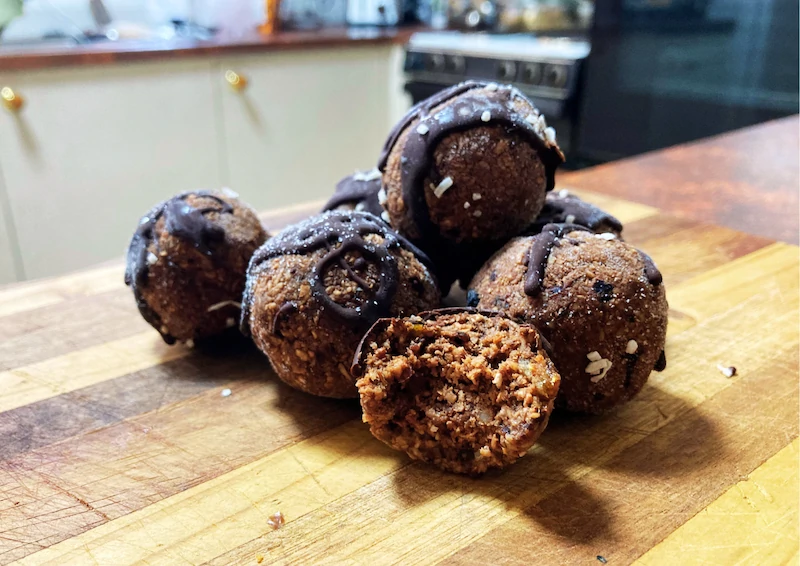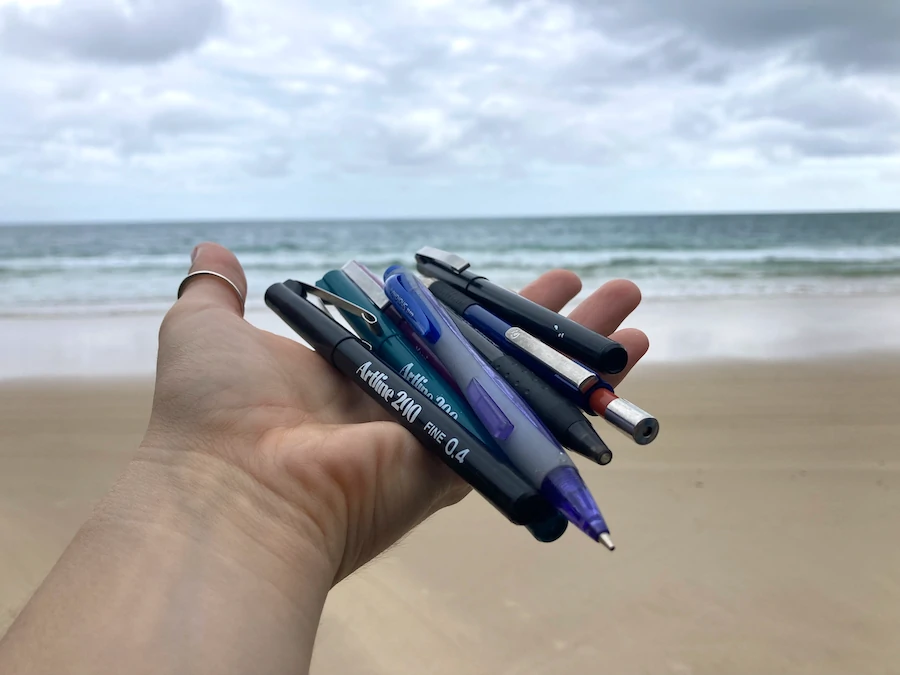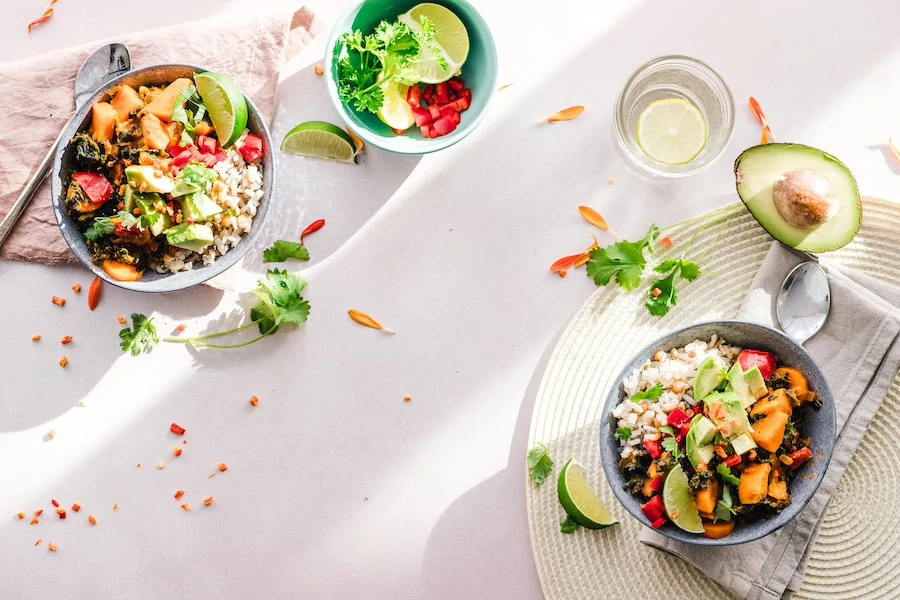
The use of bamboo in baby products has become more popular over the years and for good reasons. Bamboo is one of the most abundant, sustainable materials on the planet, much more so than other traditional materials. If you go through baby wipes as often as I used to, you may be wondering are bamboo baby wipes biodegradable.
So, are bamboo baby wipes biodegradable? Bamboo baby wipes are biodegradable because bamboo as a material is able to decompose rapidly. Bamboo baby wipes that are made from 100% natural bamboo and absent of any harmful chemicals are the most biodegradable version of bamboo baby wipes.
There are a lot of different eco-friendly bamboo baby products that’ll help your baby grow up in a safe and non-toxic environment. One of the most important things we can do for our children is to leave them a world where they can thrive and live a good life, which is why using biodegradable products is more important than ever. Why not start by using bamboo baby wipes?
What Makes Bamboo Baby Wipes Biodegradable?
Bamboo as a plant comes with some great qualities that make it a green miracle. Not only is it naturally biodegradable, but it’s also antifungal, highly renewable, soft, and abundant. It also requires far less water than more traditional plants, which saves us from using too much of our most precious resource.
When looking at what makes bamboo baby wipes biodegradable there are a couple of reasons that have lead to this outcome, including:
- Rapid decomposition.
- Created from a natural material.
These reasons alone make bamboo baby wipes biodegradable, which is also the case for many other eco-friendly materials, like hemp. Unfortunately, most of the products sold today state that they’re biodegradable, but aren’t as biodegradable as you might think.
The most important aspect of bamboo baby wipes being 100% biodegradable is that they’re able to decompose quite fast compared to other materials. Unlike plastics, which can take up to 1000 years to decompose, bamboo can take anywhere between 6 months and 10 years to fully decompose.
The timeline of 6 months to 10 years for bamboo to decompose really comes down to the physical characteristics of the bamboo product and how you decompose it. When it comes to bamboo baby wipes, it can take 6-12 months for it to fully decompose since it’s already a rather soft material.
It also makes a difference in how you decompose your bamboo baby wipes. If you simply toss them into the garbage, those baby wipes are going to take a little longer to decompose in the landfill they end up in. By composting it instead, you’ll run that time down dramatically.
One important point to make is that for bamboo baby wipes to decompose properly, they need access to enough bacteria, light, and water. This natural mix allows all types of materials to decompose faster than they normally would, which is why anything that finds its way into a landfill could stay there for a while.
Another important aspect to what makes bamboo baby wipes biodegradable is that they’re made from 100% natural material. Many products nowadays are actually made out of a mix of different materials making it more difficult to recycle and biodegrade. This is why it’s so important to find baby wipes that are made out of 100% bamboo.
When you’re able to find bamboo baby wipes that are made entirely of bamboo, you want to make sure they’re not made with any strange and harmful chemicals. Baby wipes always have some sort of solution that helps clean our babies’ skin and making cleaning easier, but you want to make sure this solution is eco-friendly; for you, your baby, and the environment.
Making sure bamboo baby wipes are able to biodegrade in the safest possible way without leaking strange chemicals into the earth can be done by simply checking the ingredients. As long as the solution is fragrance-free, you’re almost certain to have found a set of bamboo baby wipes that are safe for your baby’s skin as well as the planet.
Getting a better understanding of what makes bamboo baby wipes biodegradable definitely will help you be a better-informed consumer and parent. Giving our babies the best possible environment with all-natural, eco-friendly products is a good first step in helping them develop better and provide them a world they can thrive in.
Popular Biodegradable Bamboo Baby Wipes
It can be tough sometimes finding the right products to get for our babies since some brands aren’t as honest as they claim to be. The good news is there are several eco-friendly brands out there that make terrific products, including biodegradable bamboo baby wipes.
Caboo Tree-Free Bamboo Baby Wipes
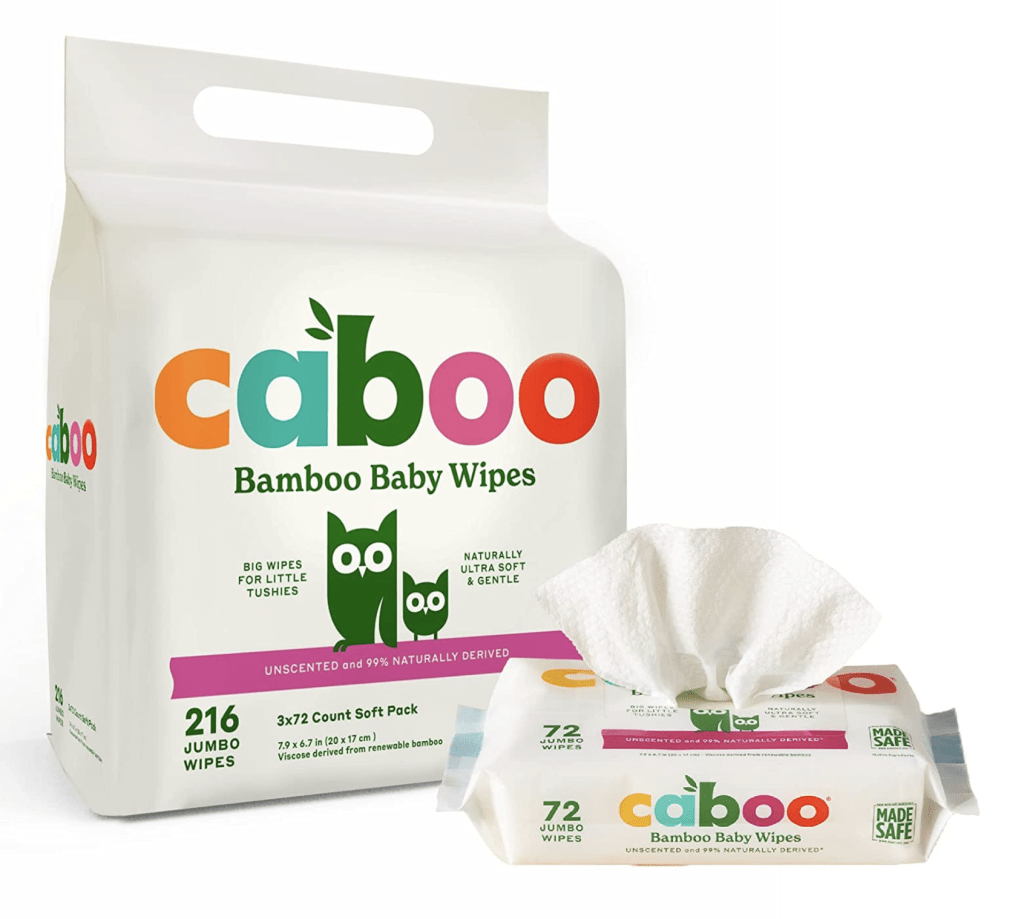
There are a lot of brands out there that claim they care about saving the environment. Thankfully, the Tree-Free Bamboo Baby Wipes by Caboo (link to read reviews on Amazon) is 100% for saving the environment while helping to keep our children safe from harmful materials and chemicals.
These bamboo baby wipes from Caboo are truly one of the best options you can go with when getting baby wipes. Their bamboo baby wipes are sourced 100% from natural bamboo that’s certified “Panda Friendly”, so no panda food is taken away. Their wipes are also free from any harmful chemicals you might find in other baby wipes, including alcohol, chlorine, parabens, phthalates, and fragrances.
Bum Boosa Eco-Friendly Bamboo Baby Wipes
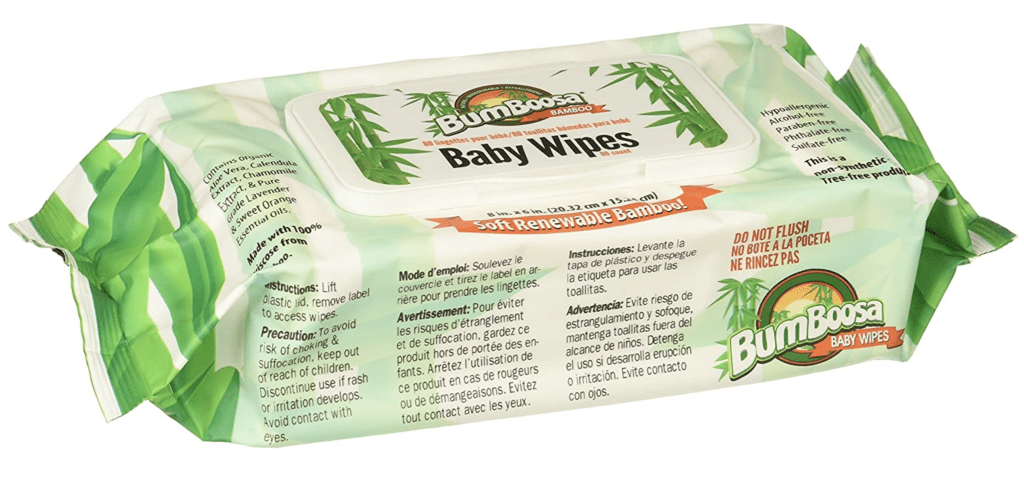
If you’re looking for a set of bamboo baby wipes that’ll leave your baby clean while also leaving a 100% natural scent behind, you definitely want to check out Bum Boosa Eco-Friendly Bamboo Baby Wipes (link to read reviews on Amazon). Without using any strange fragrances, your baby’s skin will be clean and smelling amazing with these bamboo baby wipes.
Crafted with organic aloe vera, calendula extract, chamomile extract, and 100% pure-grade essential oils, your baby’s skin is going to be left fresh and clean. Not only that, but Bum Boosa bamboo baby wipes are free from any other materials, which makes them one of the few bamboo baby wipes that are made from 100% bamboo. I definitely suggest you give these bamboo baby wipes a look!
Aleva Naturals Certified-Vegan Bamboo Baby Wipes
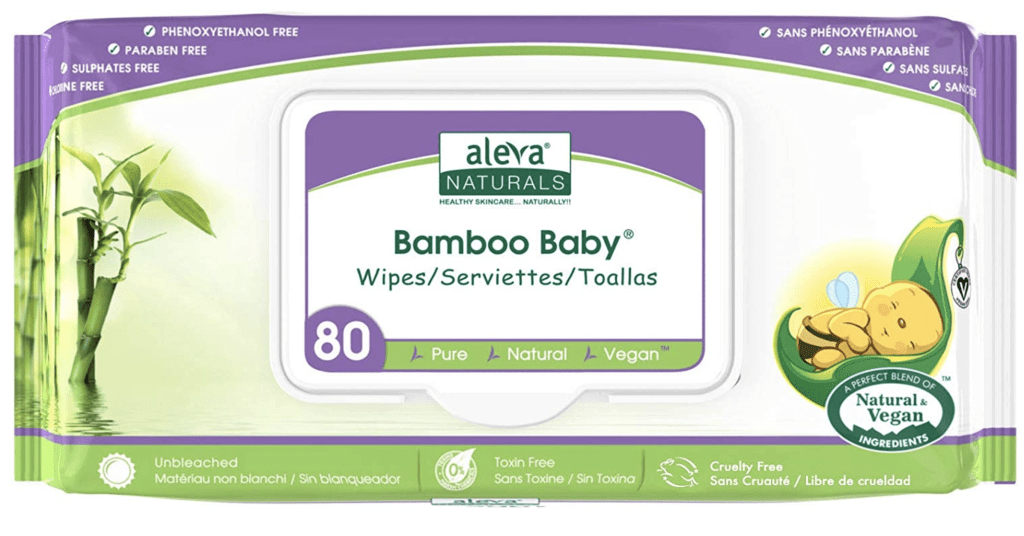
Finding baby wipes that are truly biodegradable can be a challenge, but Aleva Naturals Certified-Vegan Bamboo Baby Wipes (link to read reviews on Amazon) has hit the nail on the head with their product. Made out of 100% natural bamboo, their bamboo baby wipes take only 21 days to fully biodegrade!
These bamboo baby wipes by Aleva Naturals are some of the most eco-friendly baby wipes I’ve ever used. Not only are they an excellent choice for a more sustainable environment, but they also contain a unique blend of organic aloe vera, chamomile, tea tree oil, and lavender oil that’ll leave your baby feeling soothed, clean, and silky smooth. There’s no question Aleva Naturals has earned a spot as one of the most eco-friendly brands out there, and they really shine with these bamboo baby wipes.
Using Bamboo Baby Wipes Instead of Cotton
Many of the more traditional brands that make baby wipes are made from a mix of not so eco-friendly materials, whether because they make more money or they’re less concerned with the environment. Either way, you’ll find that many of these more traditional brands are made out of non-woven cotton, which is not eco-friendly the least bit.
Bamboo baby wipes have a lot of positive aspects to them, including being biodegradable, antibacterial, antifungal, and pesticide-free. However, that’s not the case when it comes to cotton baby wipes, which is what you’ll mostly find when out shopping for baby wipes.
Cotton baby wipes are usually less expensive than what you’d find with bamboo baby wipes, but, of course, nothing is free. While the financial cost is low, the cost to the planet and potentially your baby are certainly not low.
Producing cotton is one of the most water-intensive processes out there and consumes around 5,000 gallons (20,000 liters) of water to produce 2.2 pounds (1 kg) of cotton. Sadly, once that water has been used to make the cotton, it’s been polluted with harsh chemicals and gets dumped into our streams. This is a serious problem and can be largely avoided by using bamboo baby wipes instead of cotton.
Another issue with using cotton baby wipes over bamboo is that cotton requires a massive amount of pesticides and insecticides to grow. As a matter of fact, the cotton industry as a whole consumes around 10% of the world’s pesticides and about 25% of the world’s insecticides. Bamboo is naturally antibacterial and antifungal, so it doesn’t need any of these harmful chemicals.
Unfortunately for cotton baby wipes, they’re also often time bleached so they appear more white than they naturally are. After all, that bleach is used, it has to go somewhere and that somewhere is often our waterways. This is just another reason why using bamboo baby wipes is not only a great choice for you and your baby’s health but also the health of our planet.

